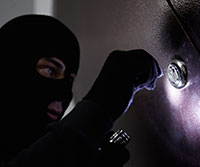Counterfeiting is a criminal activity: selling fake products helps finance crime and trafficking of all kinds.
By selling counterfeit products:
- you’re plundering recognised know-how
- you’re supporting and financing organised crime
- you’re supporting clandestine and child labour
- you’re putting health and safety at risk
- you’re destroying jobs and stifling growth
- and above all, you’re exposing yourself to criminal sanctions

Selling counterfeit products means plundering recognised know-how
Watchmakers have perfected know-how requiring thousands of hours of work in order to create unique timepieces of irreproachable quality. The protection of intellectual property is justified not only morally (designs must be acknowledged and protected) but also economically (investments and risk-taking must be rewarded). Intellectual property therefore contributes to development and progress.

Selling counterfeit products means financing organised crime
This has been demonstrated: counterfeit goods are sold through the same channels and by the same criminals; counterfeiting often relies on the same infrastructures and transport networks as other illegal activities, such as drug and weapons trafficking, contraband, prostitution, etc.

Selling counterfeit products means supporting clandestine and child labour
The people who are exploited in the manufacture of counterfeit goods, including large numbers of children, work under very difficult conditions, are paid derisory wages, and clearly do not benefit from any legal, social or medical safeguards.

Selling counterfeit products means putting the health and safety of consumers at risk
The risk is very real when you consider counterfeit products in the context of medicines, cosmetics and foodstuffs, toys, spare parts for cars or planes. It is also present in the case of counterfeit watches, since such articles do not comply with quality or safety standards and can contain allergenic or harmful materials.

Selling counterfeit products means destroying jobs and stifling growth
This form of crime contributes to the loss each year of more than 200,000 jobs worldwide, 100,000 in Europe alone. For governments, this represents fiscal losses, i.e. public money which cannot be reinvested for the wellbeing of citizens.

Selling counterfeit products means exposing yourself to the risk of criminal sanctions
Most countries consider the simple possession of a counterfeit article to be a criminal offence. Moreover, damages can be claimed by the legitimate holders of intellectual property rights. Customs are also authorised to seize and destroy illegal products and to hand out large fines.


 Stop the fakes!
Stop the fakes!